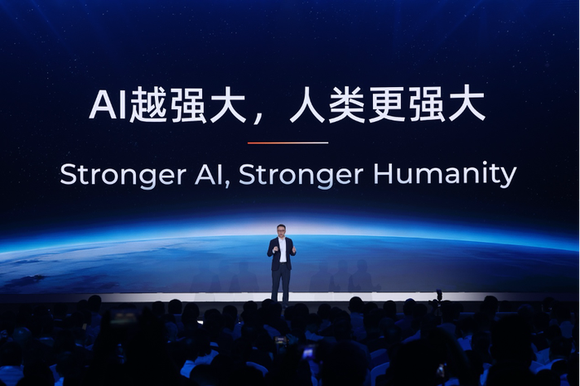Alibaba focused on agents and embodied AI, rolling out new tools and an Nvidia tie-up to speed robotics and autonomous driving projects.

Photo from Jiemian News
by XIAO Fang
Alibaba unveiled its first major update on its "all in on AI" strategy at its annual Yunqi Conference. Investors welcomed the showcase, with Hong Kong-listed shares closing up 9.16% on Sept. 24.
The company introduced seven updated models under its Tongyi Qianwen (Qwen) brand, spanning language, multimodal and speech capabilities with improvements in reasoning, coding and tool use. The flagship Qwen3-Max, trained on tens of trillions of tokens with more than a trillion parameters, underscores Alibaba's ambition to compete globally, while the new Qwen3-Next architecture promises comparable performance at a fraction of the cost.
Alibaba also open-sourced Qwen3-VL, a vision-language model that can interpret images and perform tasks such as controlling smartphones and PCs. Its Wanxiang 2.5-preview generator now produces 10-second 1080p clips at 24 frames per second, up from five seconds, while the Tongyi Bailin suite extends into speech recognition and synthesis.
Beyond models, Alibaba highlighted upgrades in self-developed chips, servers, networks and distributed storage, which the company said would improve efficiency and stability for enterprises training or deploying Qwen models on its cloud.
CEO WU Yongming positioned Alibaba Cloud as a full-stack AI service provider at the conference, outlining a two-track strategy: keeping Qwen open-source to serve as "the Android of the AI era," and building a super AI cloud he called the next generation of computer. He said large models will effectively function as the new operating system.

According to FEI Tianqi, a senior analyst at Gartner, enterprise adoption of generative AI in China surged to 43% in 2025 from just 8% a year earlier, with open models lowering entry barriers and enabling small and mid-sized firms to integrate AI into their operations.
Alibaba also pointed to emerging use cases. Its Bailian platform, a one-stop service for developing AI agents - software programs that can make autonomous decisions and perform multi-step tasks - logged a 15-fold increase in daily calls over the past year. To build on that momentum, the company introduced ModelStudio-ADK, a toolkit for creating more capable agents, and upgraded AgentBay, which allows dynamic access to cloud resources beyond local device limits. Analysts said agents are emerging as a major focus for Chinese AI as model performance approaches a plateau.
Another priority is embodied AI, applying the technology to physical systems such as robots and vehicles. Alibaba said it will partner with Nvidia to integrate simulation tools and datasets into its PAI platform, aiming to fast-track development for robotics and autonomous driving.
Broader adoption, however, will depend on factors such as reliability, transparency and cost efficiency, according to HUANG Boyuan, who heads Alibaba Cloud's AI platform. He said improvements in these areas could increase adoption tenfold.
In January, Alibaba pledged to invest 380 billion yuan (about US$53 billion) over three years in cloud and AI infrastructure - more than in the past decade combined. Wu described the initiative as only a starting point, saying AI will reshape infrastructure, software and applications and drive a new wave of digital transformation.